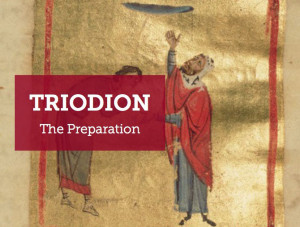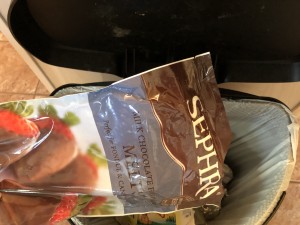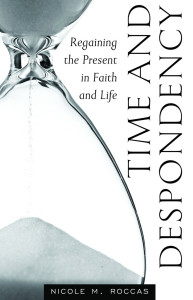 It’s been a couple of weeks since I blogged about my current (and life-long) struggle with disordered eating. (If you missed it, it’s here: “Courage and Hunger.”)
It’s been a couple of weeks since I blogged about my current (and life-long) struggle with disordered eating. (If you missed it, it’s here: “Courage and Hunger.”)
Since that post, I’ve made a spiritual shift that I’d like to share today. In the Orthodox Church, we are in a pre-Lenten period of the three weeks leading up to Lent known as the Triodion. The three Sundays in this time period, and the fourth Sunday, the day before Lent begins, are outlined here:
Sunday of the Publican and Pharisee
Sunday of the Prodigal Son
Sunday of the Last Judgment
Sunday of Forgiveness
Many people take advantage of the Church’s intensified calendar (more services, longer services, stricter fasting guidelines, encouragement to give alms, special retreats and speakers, etc.) as a time to jump-start their spiritual lives. Taking a spiritual inventory, going to Confession, and working on “pet passions” that plague you are common activities during this time. I got a head-start this year, with a productive meeting with my pastor last week, and the healing sacrament of confession.
 One of the main things I went to my father confessor for help with is my ongoing struggle with the disordered eating I mentioned above, which has intensified since I quit drinking back in September. I’ve actually gained back seven of the fifteen pounds I worked so hard to lose last year. (I wrote about this struggle about a month ago, here: “120 Days.”) I shared with him my frustration that I couldn’t apply the same effort (and God’s grace!) that I use every day to not drink alcohol to disciplining myself regarding the junk foods that seem to have me in their grip. He offered me some encouragement—both spiritual and practical advice—and I’ve been praying about it a bit more. Somehow, today, I decided to throw away the rest of the fondue chocolates in the bag in my pantry and not buy any more. And at the grocery store the other day, I made the same decision regarding the kettle-cooked potato chips. I know the struggle isn’t over, but somehow making these decisions feels like a hopeful beginning.
One of the main things I went to my father confessor for help with is my ongoing struggle with the disordered eating I mentioned above, which has intensified since I quit drinking back in September. I’ve actually gained back seven of the fifteen pounds I worked so hard to lose last year. (I wrote about this struggle about a month ago, here: “120 Days.”) I shared with him my frustration that I couldn’t apply the same effort (and God’s grace!) that I use every day to not drink alcohol to disciplining myself regarding the junk foods that seem to have me in their grip. He offered me some encouragement—both spiritual and practical advice—and I’ve been praying about it a bit more. Somehow, today, I decided to throw away the rest of the fondue chocolates in the bag in my pantry and not buy any more. And at the grocery store the other day, I made the same decision regarding the kettle-cooked potato chips. I know the struggle isn’t over, but somehow making these decisions feels like a hopeful beginning.
In the area of spiritual food, Father encouraged me to “tithe my reading” this year, especially during Lent. I told him that I read almost 50 books in 2017, but only two were spiritual. Mostly I read memoir, literary fiction, and psychology/mental health books. So, 10% of 50 = 5, so I plan to read at least five spiritual books this year. I mentioned that I love Anthony Bloom’s books on prayer, and he agreed that they are a great place to start. I went to my “spiritual” book shelves and quickly found Living Prayer and Meditations on a Theme, both of which I read over twenty years ago.
 And then I remembered that I had just gotten a new book, Time and Despondency: Regaining the Present in Faith and Life, by Nicole M. Roccas, which was just released last month. Nicole actually spoke at our women’s retreat at St. John Orthodox Church her in Memphis last year, but I was out of town and missed her talks. (She also has some wonderful podcasts, available here, on Ancient Faith Radio.) We’ve become friends on Facebook, and when I discovered her book I ordered it immediately. I started reading it today, and when I opened it, I found a quote on the page before her Acknowledgments by Anthony Bloom… and later quotes by Kathleen Norris. I knew right away we would be kindred spirits.
And then I remembered that I had just gotten a new book, Time and Despondency: Regaining the Present in Faith and Life, by Nicole M. Roccas, which was just released last month. Nicole actually spoke at our women’s retreat at St. John Orthodox Church her in Memphis last year, but I was out of town and missed her talks. (She also has some wonderful podcasts, available here, on Ancient Faith Radio.) We’ve become friends on Facebook, and when I discovered her book I ordered it immediately. I started reading it today, and when I opened it, I found a quote on the page before her Acknowledgments by Anthony Bloom… and later quotes by Kathleen Norris. I knew right away we would be kindred spirits.
In the introduction, Nicole says:
I saw my despondency for what it truly was: a condition that robbed my entire self—body, soul, and spirit—of the freedom to dwell with Christ in love.
I immediately thought about Annie Grace’s book, This Naked Mind, which helped me quit drinking, because Grace talks about finding FREEDOM, although her approach isn’t spiritual. But truth is truth, and I believe God led me to read This Naked Mind as much as He has led me to Nicole’s book.
You might be wondering what despondency/depression has to do with disordered eating (or maybe you’re not wondering… maybe you already get it)… but for me, much of my junk-food addiction and binging have to do with depression. Nicole addresses this several places in the first chapter of her book:
Despondency has an infinite array of disguises and symptoms. Among the most universal signs is inner restlessness…. For still others, despondency begins as an inclination toward sleep, eating, distraction, or worry.
I probably have some degree of (undiagnosed) ADD… I’m always looking for some excitement in my life, and I get bored easily, which is a quick slide into depression. As Nicole says:
… we manipulate even necessary activities like sleeping and eating—normally peaceful and life-giving—to serve our apathy. They become desperate efforts to soak up the boredom leaking out of every orifice of life.
I’ve only just begun reading this book, but I look forward to continuing, and then to re-reading Bloom’s books on prayer. Oh, and to actually praying more. Even before we enter Great Lent. Stay tuned… I’m sure I’ll be writing more about this journey.
Wonderful post! I enjoyed each line!
Thanks so much for reaching Claire.
Wishing you many blessings on your journey. Thank you for sharing your insights with us. They are helpful as we all have our own issues on the table that need illumination and attention.
I always appreciate your comments, Joanne… and your encouragement!
Thank you for this post for I feel encouraged by it. I sometimes feel guilty for not giving up certain food items I see others giving up during Lent. However, I try extra hard to be nicer, kinder, and spend more time in prayer and meditation to renew my faith. So, yes, I don’t give up food but spend extra time to be faithful to Him.
Different people have different Lenten traditions, Purabi. And yes, being faithful and kind and all that you said are much more important than which foods we do or don’t eat. My issues with food are rooted in an emotional disorder, and aren’t really related to the specifics of the Lenten fast… it’s just that I’m dealing with them in a new way as the season of Great Lent approaches. thanks for reading and commenting.